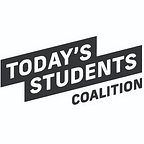The mental health of BIPOC and FGLI students still requires our attention.
Current efforts by institutions are not enough.
By Katrina Weti, LEDA Scholar
As a Black, first-generation, low-income student, my mental health has continuously been negatively impacted while attending college. Coming into college, I was already unknowingly struggling with my mental health. During my first year, I felt very alone and unsupported as I battled imposter syndrome, financial hardship, microaggressions, and academic pressures. I was bearing the trauma of navigating the world with my given identities and also feeling uncomfortable talking with my family about the stress and anxiety that I felt. I was overwhelmed trying to navigate through it all. I recall feeling my lowest in the spring semester of my second year following the passing of two Black students on campus. Despite having a robust community of Black students, faculty, and friends, I, like many of my peers, felt largely unsupported by my institution.
Often higher learning institutions present students, especially those of underrepresented backgrounds, with a unique set of challenges — mentally, academically, and financially — and many of these students already come into their institutions with preexisting traumas from experiencing racism or classism. According to Active Minds, 39 percent of students in college experience significant mental health challenges. The coronavirus pandemic has exacerbated this problem as “89 precent of college students are experiencing stress and anxiety as a result.” For many BIPOC and FGLI students, the coronavirus pandemic and political unrest have just added to already emotionally and mentally damaging college experiences. Many of us are experiencing loss and grief, as well as physical and emotional burnout from organizing and engaging in protests, which have been exacerbated by financial hardship and increased isolation.
Despite the increased need to address mental health in higher education, BIPOC and FGLI students rarely find counselors in their mental health offices that are equipped to support them. According to a 2019 poll by The Association for University and College Counseling Center Directors, around 70 precent of counseling center staff members were white and 75 percent were cis-females. This lack of representation makes it hard for students from underrepresented backgrounds to feel comfortable and validated talking about issues specific to their identities. At my school, for example, there are only two counselors who identify as people of color and they are supposed to serve the entire population of about 945 students of color. This has prevented me and many other students from reaching out in fear of burdening an already overwhelmed system. For example, when the two Black students passed in the spring of last year, instead of going to counselors, I found myself hesitantly relying on other Black students, though I feared burdening students who were also grieving. When the pandemic forced students out of the residence halls and online school presented new challenges, I found myself isolated.
Luckily, in the fall 2020 semester, I was able to connect with one of the POC-identifying counselors on campus. With her support and the support of my peers I was able to take steps toward processing my trauma and grief. However, I reflect on how long it took me to reach out, the fears I have about burdening the system, and the other BIPOC and FGLI students at other institutions facing similar struggles who may never reach out.
Supporting BIPOC and FGLI students academically and socially requires supporting their mental health. In order to adequately address the mental health of their BIPOC and FGLI students, colleges should hire trauma and culturally informed mental health professionals trained and focused on issues surrounding BIPOC and FGLI students. Beyond wellness centers, college campuses need to make anti-racism work a priority in their mission and work as institutions. If institutions created a campus culture that did not allow acts of intolerance and centered the support of underrepresented groups, of all abilities, college campuses could begin to better support their students. Not only is the academic success of these students on the line — so are their lives.
